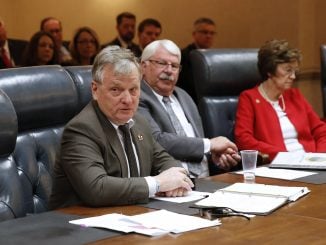
RALEIGH — An estimation of how much debt capacity the state has heading into the next decade is the subject of a recent report disseminated by State Treasurer Dale Folwell.
Fears that COVID-19 would damage the state’s revenue stream and its ability to borrow funds are tempered in the study, which says, “general revenue projections show a positive growth trend for the next 10 years.” Despite that positive trend, the report says debt capacity for transportation projects will reach the end of the line within the next four years.
“This is not political or emotional, but mathematical,” Folwell said in a statement. “We have almost $40 billion in unfunded pension and health care liabilities. That bill will come due much sooner than people realize. We’re doing what’s necessary at this point in the state’s history because others didn’t. As Gov. Martin said, ‘…doing right is rarely wrong.’”
As of June 30, 2020, the state’s outstanding debt stood at around $8.1 billion, the majority of which, $5.2 billion, was tax supported.
The annual 2021 Debt Affordability Study is reviewed and approved by a nine-person Debt Affordability Advisory Committee (DAAC). The annual study determines the level of additional debt the state can take on while maintaining North Carolina’s triple-A ratings. North Carolina remains one of just 13 states with “AAA” bond ratings from all three major rating agencies.
The DAAC’s report says that the state’s General Fund has debt capacity of around $1.458 billion spanning the next 10 years, assuming the state follows the DACC’s recommendation of directing $100 million to the Unfunded Liability Solvency Reserve on an annual basis. By doing so, the state can address items like the $39.8 billion in pension and Other Post-Employment Benefits liabilities. Pension liabilities across all plans account for around $2.4 billion.
Members of DAAC include Folwell, who serves as the chair, as well as secretary of revenue Ronald Penny, state controller Linda Combs, state budget director Charles Perusse, and state auditor Beth Wood. There are also two Senate appointees and two House appointees.
A main finding of the study was the estimated debt capacity of the General, Highway and Highway Trust Funds for the upcoming 10 fiscal years. The DAAC’s findings state that transportation debt service will “increase markedly” over the next 10 years and will surpass the $3 billion debt threshold set by law in 2018.
“Assuming all $3 billion of the Build NC Bonds are issued, the 6% cap on Transportation debt services revenues will be violated beginning FY 2026 resulting in no available transportation debt capacity,” the study reads.
Debt service projections include any outstanding future issuance on the $400 million of Connect NC Bonds and the $2 billion in Build NC Bonds.
The Build NC Bonds, approved in 2018, look to the Highway Trust Fund as its source of repayment. The DAAC report notes that “actions that diminish” the Highway Trust fund will likely impair the Build NC bonds. In October 2020, the Council of State approved a $700 million bond sale as part of the Build NC transportation bond package.
The DAACs study also mentions the struggles the North Carolina Department of Transportation (NCDOT) has had with budget issues for the last two years, including unfavorable audit findings.
A May 2020 audit showed the agency had projected spending of $5.94 billion but ran past that estimate by around $724 million. Budget shortfalls due to overspending were made worse due to decreasing gas tax revenue receipts because of the COVID-19 travel restrictions put in place by the governor. The decreasing revenue also caused rolling layoffs at the NCDOT in June.
A second audit released a few months later, in July, said the NCDOT had made improper salary adjustments which exceeded the pilot program’s “two-percent-of-payroll-expense limit” and resulted in $39 million in overspending.




